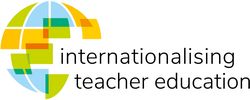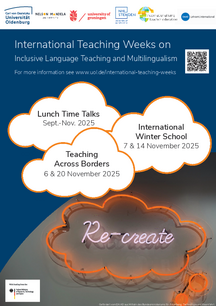Kontakt
Summer/ Winter Schools
Im November findet jedes Jahr eine Winter School (in Südafrika ist es zu dem Zeitpunkt Sommer, insofern ist es auch eine Summer School) mit allen Projektpartnern und ihren Lehramtsstudierenden statt. Um eine möglichst hohe Teilnahme zu ermöglichen, führen wir die Veranstaltungen der Winter School in einem hybriden Format durch.
International Winter School: Inclusive Language Teaching
07 and 14 November 2025 (online)
Die diesjährige International Winter School widmet sich einem zentralen Thema für Schule und Unterricht: Sprachsensibler Unterricht und Mehrsprachigkeit.
An zwei intensiven Tagen erwarten die Teilnehmenden vielfältige, innovative Seminare, die von Lehrenden und Studierenden der Nelson Mandela University, der Rijksuniversiteit Groningen, der NHL Stenden und der Universität Oldenburg gestaltet werden. Die Veranstaltungen geben praxisnahe Einblicke in Lehre und Forschung und sensibilisieren angehende Lehrkräfte für Klassensituationen, in denen die Muttersprache vieler Schüler*innen von der Unterrichtssprache abweicht.
Im Fokus stehen die Fragen:
- Wie kann sprachliche Vielfalt im Unterricht angemessen berücksichtigt werden?
- Wie lassen sich sprachliche Barrieren abbauen und Lernprozesse erleichtern?
Ein weiterer Schwerpunkt liegt darauf, wie Sprache genutzt werden kann, um Vielfalt positiv sichtbar zu machen und so sicherzustellen, dass sich alle Schüler*innen gleichermaßen gesehen, wertgeschätzt und einbezogen fühlen. Auch dies ist ein wesentlicher Bestandteil sprachsensiblen Unterrichts.
Teilnahme
Lehramtsstudierende aller vier Partneruniversitäten sind herzlich eingeladen, an der Winter School teilzunehmen.
Wir empfehlen Ihnen, sich bis zum 5. November bzw. 13. November anzumelden.
07 November 2025
Official Welcome
Prof. Dr. Katharina Al-Shamery - Vice President for Academic Careers, Equal Opportunities and International Affairs
Music as Language: Identity, Emotion, and Protest
Presenters: Douglas Bell (NHL Stenden), Martin Butler (University of Oldenburg), Marelize van Heerden (Nelson Mandela University), Robert-Jan Smit (NHL Stenden)
This workshop explores how music functions as a form of language across cultures that shapes identity, emotion, and social meaning. Through selected songs participants will examine the psychological, bodily, social, and political dimensions of music as expression. The session combines theoretical input with the opportunity for listening to and discussion of selected music. It encourages participants to consider how music can be used in the classroom and how this creates opportunities to teach empathy, inclusion, and social justice.
Responding to diverse classroom-language realities: what are the possibilities for teaching, learning and assessment
Presenters: Cina Mosito (Nelson Mandela University), Vuyani Matsha (Nelson Mandela University)
Lunch break
Presentation on video experience & school report
Students of the Teaching Across Borders course 2025 (from NMU, UOL, RUG and NHL Stenden)
Reframing Linguistic Ecologies of International Higher Education: A Translanguaging Perspective
Presenter: Rafi Saleh (University of Groningen)
This session explores the dynamic role of translanguaging practices in international higher education, drawing on comparative insights from the original study in Bangladesh (Rafi & Morgan, 2022) and a new replication study at an international university in the Netherlands.
Using a 'Russian doll' approach, the research analyses the disconnect between language policy and classroom practice at macro (national), meso (institutional), and micro (classroom) levels. Findings from Bangladesh revealed a disconnect between policy and classroom practice, with varying degrees of natural translanguaging. In the Dutch context, a similar gap appears, with English serving as the dominant lingua franca, while teachers retain autonomy in language choice.
Translanguaging occurs naturally in student group discussions and is supported by teachers, though often without a clear pedagogical focus. This highlights the pressing need for professional development grounded in translanguaging scholarship, so that existing support can be transformed into systematic and effective practice. The discussion will ultimately show how these comparative findings create a clear scope for building such development programs.
As universities globally, and in the Netherlands specifically, navigate the complex balance between English-medium instruction and the protection of national languages, this session will demonstrate how a formal translanguaging framework can foster a more inclusive, effective, and equitable multilingual ecology for all students in international higher education.
14 November 2025
Reflecting on inclusive language teaching in multilingual contexts: a journey of discovery
Facilitators: Logamurthie Athiemoolam (Nelson Mandela University), Siyasanga Manakele (Nelson Mandela University), Bukiwe Tiyane (Nelson Mandela University)
Student participants: Carlisle Bennett, Sisanda Dumezweni, Kerry-Lee Kotzee, Mawande Krwentsani, Jude Leander, Polite Mahle Jack, Njabulo Mavuso, Nangamso Mgxekwa, Azukile Mtshiyo, Lihle Ntutumbo, Erin Poisat, Kayla Saunders, Lance Septoo, Jocelyn Viljoen
Language teaching in South Africa involves navigating across a diversity of languages, given that South African learners could speak any of the twelve official languages in a class. In Gqeberha, in the Eastern Cape province, three of the official languages, namely English, Afrikaans and isiXhosa predominate, which implies that teachers need to have a knowledge of these languages if they hope to assist the multilingual learners in their classes optimally.
Taking this background into account, this presentation provides insights into PGCE students’ experiences of teaching English, Afrikaans and isiXhosa during their school-based learning experiences across a diversity of contexts, with a view to examining how some of the lessons that they learnt could contribute to effective language teaching and learning in multilingual contexts.
The presentation uses the PGCE students’ voices as a starting point to interrogate key issues relating to inclusive language teaching and learning in Gqeberha and simultaneously provides a platform for all the participants from both Nelson Mandela University and University of Oldenburg to share their insights and experiences in inclusive language teaching and learning across a diversity of contexts.
Tea break
Inclusive language teaching in post-colonial African classrooms: challenges and opportunities
Presenters: Zoliswa Made (Nelson Mandela University), Siyasanga Manakele (Nelson Mandela University)



